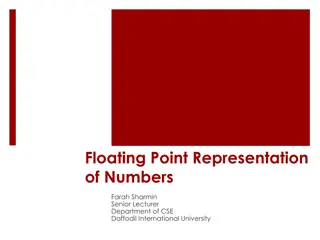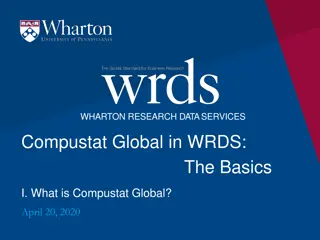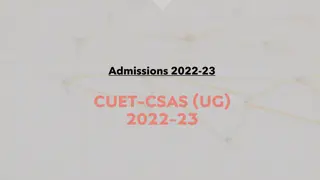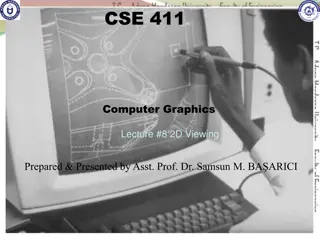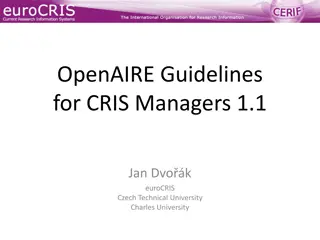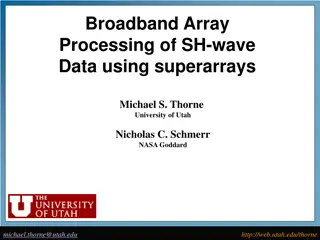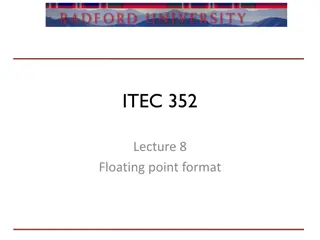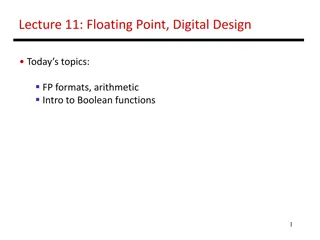Understanding Floating Point Representation of Numbers
Floating point representation is crucial in computer arithmetic operations. It involves expressing real numbers as a mantissa and an exponent to preserve significant digits and increase the range of values stored. This normalized floating point mode allows for efficient storage and manipulation of r
0 views • 12 slides
Understanding Compustat Global in WRDS: Key Insights and Data Overview
Compustat Global in WRDS offers a comprehensive collection of over 500 company-level fundamentals for publicly traded companies in global markets, covering more than 80 countries. The data includes income statements, balance sheets, cash flows, market data, and more, with no survivorship bias. With
1 views • 27 slides
Central Universities Entrance Test (CUET) 2022-23: Admissions Information for Undergraduate Programmes
The Common Universities Entrance Test (CUET) by the National Testing Agency (NTA) for Academic Session 2022-23 offers a single-window opportunity for admission to Central Universities (CUs) across India. Admissions are based solely on the normalized scores obtained in CUET, with no specific criteria
0 views • 33 slides
Understanding 2D Viewing in Computer Graphics
Exploring the concept of 2D viewing in computer graphics, this lecture covers the 2D viewing pipeline, including clipping, window normalization, viewport transformations, and OpenGL 2D viewing functions. It explains how a picture is defined using a Cartesian coordinate system, selecting views within
2 views • 84 slides
Residence Returning Scheme Points Allocation Guidelines
This document outlines the points allocation guidelines for the Residence Returning Scheme, covering categories such as Academic Excellence, University Contributions, Hall-Based Contributions, and Discipline Deduction. It provides detailed criteria for scoring in each category, including GPA points
0 views • 21 slides
Shifting Relations Between China and Japan: A Path to Cooperation
The relationship between China and Japan has transitioned from confrontation to détente, marked by positive momentum and normalized tracks in their interactions. This shift, influenced by global dynamics and business interests, signals potential for a healthier mix of cooperation and competition in
0 views • 36 slides
Evaluation of Resistant Hypertension and Hypokalemia in a Young Female
A 38-year-old female with a history of resistant hypertension and hypokalemia was referred for evaluation. She had been on multiple antihypertensive medications but still had uncontrolled blood pressure and low potassium levels. After treatment with potassium supplementation and adjustment of medica
0 views • 50 slides
Guidelines for CRIS Managers in Research Institutions
These guidelines provide valuable insights for CRIS Managers in research institutions, covering metadata interchange formats, publication types, and affiliations. The document suggests improvements for a more streamlined approach to information sharing, with a focus on enhancing API compatibility an
0 views • 10 slides
Understanding Cheating in Online Classes: How Concerned Should We Be?
Growth in online classes has raised concerns about cheating. Research shows a disconnect between students and faculty perceptions of cheating rates. Factors driving cheating include pressure for better grades, normalized attitudes, and changing cultural norms. Certain student demographics, such as t
0 views • 18 slides
Understanding Pricing Dynamics through Cell Analysis in Bangladeshi Industries
This study delves into the pricing dynamics of listed stocks in Bangladeshi industries through cell analysis, aiming to differentiate value, growth, undervalued, overvalued, and normalized growth stocks. It explores how portfolio managers can categorize stocks and the discrepancy between market and
0 views • 32 slides
Understanding Text Similarity Techniques in NLP
Explore various text similarity techniques in Natural Language Processing (NLP), including word order, length, synonym, spelling, word importance, and word frequency considerations. Topics covered include bag-of-words representation, vector-based word similarities, TF-IDF weighting scheme, normalize
0 views • 62 slides
Broadband Array Processing of SH-wave Data Using Superarrays
Broadband array processing of SH-wave data using superarrays at High Lava Plains (HLP) with a flexible array of 118 broadband stations deployed between 2006-2009. The processing involves transverse component displacement seismograms aligned and normalized to unity on direct-S, and Vespagrams analysi
0 views • 15 slides
Analysis of STEM Study Sites and Student Engagement at Georgy Holden
The analysis explores the total views and engagement of STEM study sites across various subjects such as Computing & IT, Maths and Stats, Science, Engineering, and more at Georgy Holden. It delves into the normalized views, forum activity, and students' feedback on site accessibility. Math and Stats
0 views • 11 slides
Challenges and Progress in Access to Safe Abortion in Spain
Understanding the current landscape of safe abortion in Spain reveals obstacles like anti-choice harassment, geographic disparities, and conscientious objections. Despite legal protections, there are still challenges in ensuring access to abortion services, with issues like quality care and provider
0 views • 22 slides
Understanding Floating Point Numbers in Computer Science
Exploring the concepts of floating point format, normalization, conversion processes, and IEEE 754 standard for representing floating point numbers in computer systems. Learn about two's complement, excessive notation, and the components that make up a floating point number. Dive into examples of co
0 views • 18 slides
Understanding Floating Point Formats and Arithmetic in Digital Design
Today's lecture covers the concepts of floating-point formats and arithmetic in digital design, focusing on special cases, normalized and denormalized numbers, as well as IEEE 754 format representation. Through examples and explanations, learn how to convert decimal numbers to single-precision binar
0 views • 19 slides
